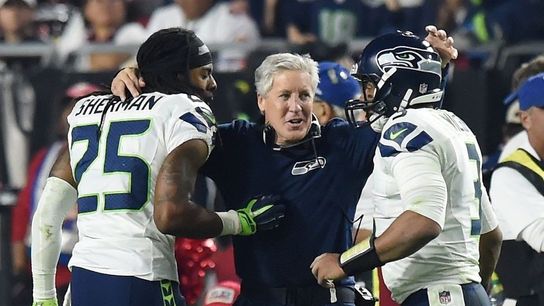NFL teams have problems just like yours, only bigger. Their highs are higher, their lows lower and their personalities are larger. There's no greater example of that in today's league than the Seattle Seahawks.
The Seahawks were on the verge of a dynasty in 2013-14, blasting the Denver Broncos for their first Super Bowl to win the franchise's first title to close the '13 campaign and needed just one more yard to upend the New England Patriots a year later. We all know how that ended.
https://www.youtube.com/watch?v=U7rPIg7ZNQ8
The Seahawks have reached the NFC Divisional Playoff round in each of the two seasons following that one -- which is actually a much better rebound than most Super Bowl losers manage (see: 2016 Carolina Panthers) -- but something inside the club's soul broke on that play.
The gif that circulated the Internet in the aftermath of Malcolm Butler's interception was actually a perfect representation inside Seattle's locker room, particularly with the player it features.
Had Russell Wilson's pass landed in Ricardo Lockette's arms instead of Butler's, that Seahawks defense could have laid claim to the best defense in modern NFL history, punctuated by back-to-back wins over Peyton Manning and Tom Brady on the brightest stage in American sports. And now, well...
ESPN's Seth Wickersham has a wonderful story out about the Seahawks since that loss, and particularly how that Russell Wilson interception changed -- or at least exposed -- the fractured dynamic between Richard Sherman, Wilson and Carroll. In short, Sherman (and, by proxy, the rest of the defense) feels Wilson gets unearned preferential treatment from Carroll and team executives and that the defense is held to a higher standard to cover for an underperforming offense. Carroll, meanwhile, built his coaching philosophy on looking beyond defeats and encouraging players to showcase their personalities.
And it all boils back to that damn pass.
Take this example from a loss to the Rams late last season, nearly two full years after the Super Bowl loss:
Sherman was asked how he would react if an offensive player jumped on a defensive coach. "If we had something like zero blitz in the Super Bowl and got bombed for a touchdown to lose, then I'm sure [it would] be understandable," he said.
It was unbelievable: Less than three weeks before the playoffs, Sherman was bringing up the Butler interception. Some players felt that if Carroll had just once stood before the team and apologized for not ramming Marshawn Lynch into New England's front from the 1-yard line -- a front that had stuffed him on short yardage twice earlier -- they would have had closure. But Carroll never apologized. And won't. By calling a pass, he wanted to maximize his scoring chances and preserve his last timeout. Bill Belichick has backed the rationale more than Carroll's own team.
The entire story is a great examination in a coach's challenge to manage opposite personalities while maintaining chemistry and protecting a culture. Read it here.
